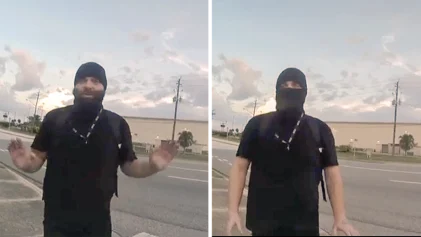An Oklahoma man who accused county jail guards of “behavior tantamount to torture” was found dead three days after being booked in the same jail, according to court documents obtained by Atlanta Black Star.
Reports show John Basco, 48, was found unconscious in his cell at the Oklahoma County Detention Center on Sept. 10. Jail officials said there were no apparent signs of foul play. Spokesperson Mark Opgrande said investigators would look into a possible drug overdose.
However, Basco’s family and his attorney have raised suspicions. Basco is involved in a lawsuit accusing two former detention officers of restraining him and other inmates and forcing them to listen to the viral kids song “Baby Shark,” sometimes for hours. Officials said the jail staff involved either resigned or retired. They are all facing criminal charges.
Basco’s attorney Cameron Spradling said the news of his client’s death is “disturbing.”
“I’m really bothered by this,” Spradling said. “One of the ‘Baby Shark’ victims is conveniently dead within three days of his arrival at the jail. How does that happen? District Attorney David Prater just lost one of his witnesses for the upcoming criminal trial. For me, this one does not pass the smell test.”
A federal lawsuit filed in November 2021 names Oklahoma County’s Sheriff’s Office, Oklahoma County Criminal Justice Authority, the Board of County Commissioners and the two former guards. Basco, Ja’Lee Forman Jr., Daniel Hedrick and Joseph Mitchell allege that in November 2019 and December 2019, they were removed from their cells and handcuffed to a wall in an empty visitation room for long periods of time and forced to listen to a continuous loop of “Baby Shark” so loud “that it was reverberating down the hallways.”
“It’s a known torture device that’s used by the CIA,” Spradling said. “In other words, to play it on a loop for hours on end, and they just did it for sport.”
Reports show ex-officers Christian Miles, Gregory Butler Jr. and former Lt. Christopher Hendershott were charged with four counts of cruelty to prisoners, corporal punishment to an inmate and conspiracy. Oklahoma County District Attorney David Prater described the “Baby Shark” punishment as “cruel and inhumane” and said that it put “undue emotional stress on the inmates who were most likely already suffering.” The plaintiffs are seeking $75,000 in damages.
Miles and Butler had a “history of mistreatment,” court documents show. The lawsuit alleges that Hendershott was aware of the guards’ misconduct but didn’t intervene, and the county failed to train and supervise its officers on the appropriate use of force. The pair had nearly 20 handwritten complaints against them, according to a probable cause affidavit.
Miles told investigators that he and Butler used benches, bars and attorney booths to discipline people detained in the jail to teach them a lesson because they felt the disciplinary actions implemented in the facility were not harsh enough. Miles said the victims often “pissed off” Butler. The lawsuit says that the guards would clear the furniture from the visitation room and make the men stand restrained for up to four hours.
Spradling compared the punishment to a technique used to break prisoners of war at Guantanamo Bay, who were forced to listen to Metallica’s “Enter Sandman,” according to a news report. The lawsuit also cites studies on music used for torture at the U.S. military prison and Nazi concentration camp Auschwitz.
“Amanda Daly, a professor of Ethnomusicology at Boston University entitled her presentation as ‘Words and War(riors): Music and the War on Terror’ to explain that music is frequently employed by American soldiers in wars in Iraq and Afghanistan and the torture technique is the loud use of ‘children’s music’ while a prisoner is alone in a room and being placed in a ‘forced standing’ position,'” the lawsuit says.
In 2008, the U.S Department of Justice declared the conditions at the Oklahoma County Detention Center unconstitutional. Federal investigators found a lack of supervision, staffing and basic medical and mental health care. The jail was also overcrowded and had a high rate of assaults and deaths, the DOJ said. The county agreed to fully fund and staff the jail by 2014. However, Spradling alleges that high rates of assault, violent use of force and deaths are still prevalent.
A spokesperson said when the sheriff’s office heard the allegations against Miles and Butler in December 2019, an investigation was launched and the officers were “immediately removed from having contact with inmates.”
Basco was a pretrial detainee in December 2019, when Miles took him from his cell at 2 a.m., forced him to stand in a “stress position” in the visitation room and listen to the song for two hours, the lawsuit alleges. It was “tantamount to torture,” “excessive and not rationally related to any legitimate governmental or penological purpose,” it says.
Reports show Basco had a criminal record that dated back to the mid-1990s, but court documents do not show what he was awaiting a hearing for in 2019.
On Sept. 7, he was booked int the detention center for drug trafficking and carrying or possessing a firearm as a convicted felon, according to reports. The man’s attorney said he didn’t know he was arrested until he received a call from Basco’s sisters telling him his client was dead.
“Imagine this, you call the jail and find out that your only brother, who’s only 48 years old, in good health, you can see from the booking photos is clear-eyed, in good health, clear-eyed – is mysteriously dead,” Spradling said.
Opgrande said in a statement that the state medical examiner’s office would determine what killed Basco and the Oklahoma State Bureau of Investigations would join the probe into his death.
“We would like to note Mr. Basco’s lawsuit was against the previous jail administration, not against the Oklahoma County Criminal Justice Authority or the current leadership,” the jail spokesperson said. “We remain committed to providing the safest environment possible for detainees and staff.”


